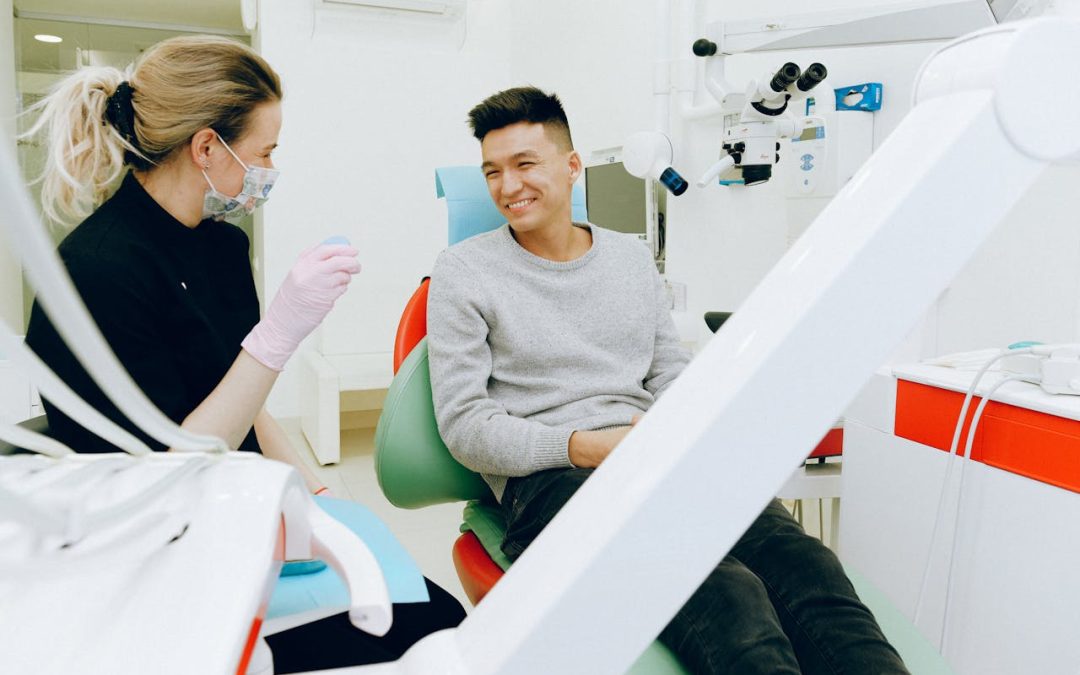Dentists can help nervous patients through:
- Communication
- Relaxation techniques, including soft music
- Gentle lighting
- Start with smaller procedures
- Numbing gel
- Different types of sedation
Dental anxiety is very common, affecting both adults and children. Many people feel nervous before a dental visit because they associate it with pain, discomfort, or a lack of control.
According to research from the British Dental Journal, around 36% of adults in the UK experience some form of dental anxiety, while about 12% have a more severe fear known as dental phobia.
The sounds of drills, the smell of disinfectants, or memories of painful experiences in childhood can all contribute to this fear. Some patients also worry about embarrassment, especially if they have avoided the dentist for a long time and are concerned about the condition of their teeth. For others, it is not the treatment itself but the idea of sitting still in the chair, feeling trapped or unable to speak, that causes anxiety.
A1 Dental Surgery is an experienced team of dentists in Kent, with huge success in helping nervous patients. To discuss your requirements, call 01227 765 851 or email us at a1teeth52@yahoo.com
What is it like for children to visit the dentist?
For children, visiting the dentist can be a confusing and sometimes frightening experience. They may not understand why the dentist needs to look inside their mouth or use noisy tools. Children often respond to new environments with uncertainty, and the bright lights, masks, and instruments can make them feel uncomfortable.
Children’s dentists know that patience and clear communication are essential. They often explain each step in simple words, allowing the child to see or touch some of the instruments before treatment begins. This helps build trust and reduces fear.
For children with ADHD, dental visits can be even more challenging. ADHD affects concentration and impulse control, which can make it difficult for a child to stay still during a procedure. The noise and bright lights of a dental surgery may also be overwhelming, leading to sensory overload or frustration. Studies show that children with ADHD are twice as likely to experience anxiety during dental visits compared to those without ADHD.
To help, dentists may schedule shorter appointments, take regular breaks, and use calming language or visual aids. Some dental clinics even design their rooms to be more child-friendly, using softer colours and soothing music to reduce stress.
How do dentists make the experience calmer for nervous patients?
Dentists today are trained to recognise signs of anxiety and respond with care and understanding. One of the most effective approaches is communication. A dentist who takes time to explain each step of the procedure helps patients feel more in control. Knowing what is going to happen can reduce fear and make the experience smoother.
Many dental practices now use relaxation techniques such as soft background music, aromatherapy, or gentle lighting to create a more peaceful environment. For routine check-ups, dentists might begin with small, simple procedures to build confidence before moving on to more complex treatments.
When it comes to fillings or root canals, the use of modern anaesthesia makes these treatments almost painless. Dentists can also offer conscious sedation to help patients stay relaxed but still awake. In more severe cases of dental phobia, sedation dentistry or intravenous sedation may be recommended to ensure the patient remains calm and comfortable throughout the treatment.
What other techniques help reduce fear during dental treatment?
Some dentists use a method known as “tell-show-do.” This approach involves explaining the procedure (tell), showing the equipment or technique in a non-threatening way (show), and then performing the procedure (do). It is especially useful for children and nervous adults because it removes the element of surprise and builds confidence step by step.
Distraction techniques also work well. Dentists may provide televisions on the ceiling, music through headphones, or even virtual reality glasses during longer treatments. These small touches help patients focus on something pleasant rather than the dental procedure.
Breathing exercises can also be helpful. Dentists might encourage patients to take slow, deep breaths to reduce tension. Some practices even train their staff in mindfulness or relaxation techniques that they can guide patients through during treatment.
How can patients and dentists work together to make dental care easier?
The key to overcoming dental anxiety is trust and teamwork. Patients should feel comfortable talking about their fears openly. When the dentist understands the reason for the anxiety, they can adapt their approach to provide reassurance and comfort.
For example, a patient who fears pain might be offered extra numbing gel before an injection. Someone who dislikes the sound of the drill might be given noise-cancelling headphones. These small adjustments can make a big difference.
A positive dental experience can transform a patient’s attitude toward oral care. Regular visits become less stressful, and patients are more likely to maintain good dental hygiene. Over time, many nervous patients find their fear gradually decreases, allowing them to approach future appointments with confidence.
In conclusion, dentists today have many effective ways to support nervous patients. From creating a calming environment to using modern pain management and communication techniques, they help ensure that dental care is safe, gentle, and stress-free for everyone—no matter their age or level of anxiety.


Recent Comments